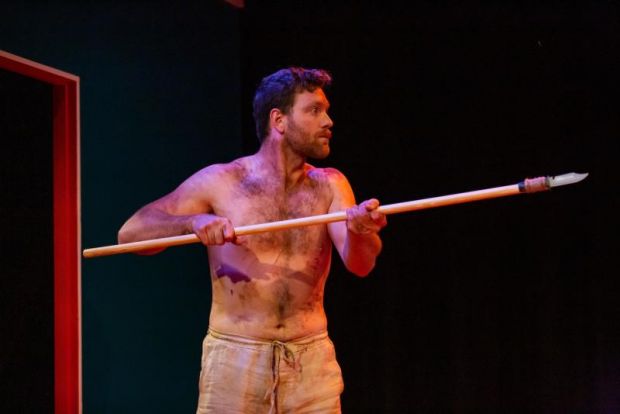Conviction
Conviction is a postmodern, ‘anything goes’ one-act play in three slices, each one taking us inside the mind of a young female playwright – in a play by a young female playwright. The character is named ‘Zoey’ and is a semi-fictional version of the playwright herself as she procrastinates her way through the day, with looming deadlines and domestic pressures. Zoey voices her self-consciousness about repeating herself in her work, about not having anything to say, and about striving to win rave reviews and awards if possible – which she knows she can do, if only she can write about something important, and not just focus on herself – as is the usual gripe from the theatre reviewers. A reviewer writing about Conviction could get caught in a mobius loop, the play a self-fulfilling prophecy of its own fictional reviews.

Zoey Dawson really is an award-winning writer, performer and teacher of Scriptwriting and Performance Writing based in Melbourne. In Conviction she lays bare her own psyche in a triptych that reflects the writer’s mind as she struggles to write 5000 words while juggling the everyday realities of relationships, pets, and cooking a complicated Yotam Ottolenghi fish dinner. Dawson has a great sense of comedy in words and a fun feel for surrealism, but there is no suspense or tension about the deadlines to write or cook, which would have added an edge to the play. She freely mentions contemporary pop culture in her script and, as a screenwriter, she is no doubt influenced by films such as Being John Malkovich and, I’m guessing, sitcoms such as Seinfeld, in her self-referential style. Dawson has also toyed with the ‘play within a play’ in her comedy, The Unspoken Word is ‘Joe’, which also features an examination of a writer’s psyche and anxiety in a semi-fictional version of herself. The playwright in Convict sets out to write something new, something feminist that will change the world. Her early settler play about colonialism morphs into a post-apocalyptic wasteland. Her characters invade her reality and appear in her home as she writes, eats pizza and gets stoned. They accompany her to the supermarket to get ingredients for the impending fish dinner.

Director Kate Wild does an excellent job with four very strong performers, keeping a snappy pace – as any flab in the timing would cause this piece to flatten. Designer Sarah Winter, Lighting Designer Christine Felmingham and Sound Designer Anna Whitaker achieve a great deal with the small stage space. And time-shifting, repeated scenes are lit in a clever blur with a rewind sound effect that adds to the comic edge created through sharp timing by the actors. This is a great team, well worth seeing in this collaboration, who are obviously enjoying bringing this surreal jigsaw puzzle to life. Emily Burton is luminous as Dawson’s alter ego, Zoey the playwright, and as Lillian the newly arrived young Australian. She has a goofy comic presence that is a joy to watch. Luisa Prosser plays two maternal characters and shows versatility as she veers easily between comedy and drama. Kevin Spink is hilarious as William, the colonial upstart but also believable as the playwright’s long-suffering partner. And Jeremiah Wray manages to balance portrayals as romantic hero, comic sidekick and menacing home-invader – all in the space of just over an hour. In the trio of scenarios, the earlier colonial saga and the writer’s own home life are the strongest. The seriousness of the post-apocalyptic setting feels like a wasted opportunity for more humour. But the writer’s brainsnap is very amusing as she skips around the characters and fast forwards through areas she knows she must come back to later to redraft. The only trouble is that, while fun and very well acted, the written scenarios are separate, inconsequential pieces, connected only through the mind of the artist. It feels like something is missing to tie the whole together. The writer tries to fill the gap with a stream-of-consciousness list of images from the playwright’s life. It is an enjoyable and poetic series of snapshots, but a weak conclusion to the piece as a whole. A narrator’s voice asking from the dark ‘Did you understand it all?’ reminds me once again of that ‘clever’ TV show about nothing – and that mobius loop. I feel goaded as a reviewer to say, ‘I didn’t quite get it’ to which the playwright would retort, ‘But that was the whole point!’
Beth Keehn
Photos: Stephen Henry

Subscribe to our E-Newsletter, buy our latest print edition or find a Performing Arts book at Book Nook.

